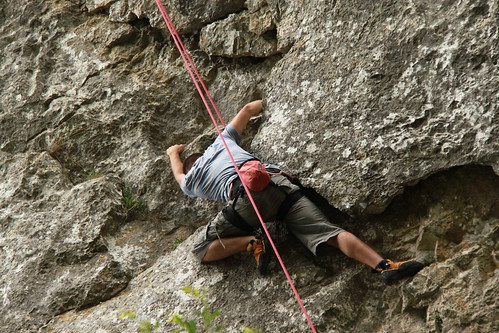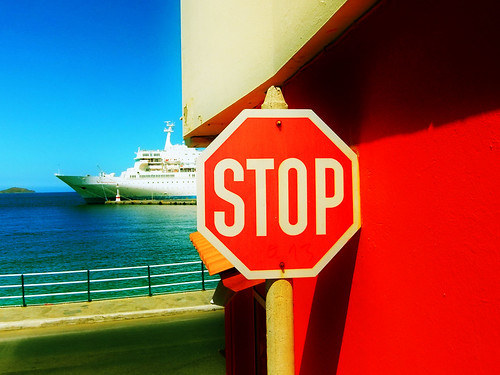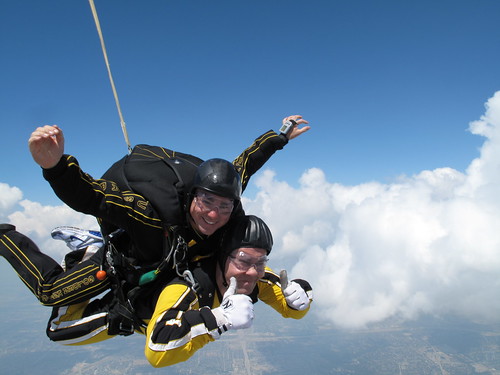“We are what we repeatedly do.”
– Aristotle
This quote sums it up, perfectly. The bottom-line is that your thoughts, your feelings, and your behavior, are all a product of what you do over and over. For example, if you think negatively all the time then you’re going to see the whole world through a darkened, grimy lens. In fact, everything about you will be dripping in negativity. And this, of course, is a habit.
More to the point, if you continue with bad habits, the kind that make you negative, unproductive, and keep you stuck where you are, then nothing will ever change. So in order to change your life for the better, you have to develop good habits that make being anxiety free easy.
Over the course of my anxiety sickness I’ve developed a set of rules that I follow, and over time these rules have become habits that I live by. These habits allow me to be as cool as a cucumber about 98.9% of the time. I believe that if you make the following list into habits of your own, then you will, at the very least, reduce your anxiety, and possibly even get rid of your abnormal anxiety for good.
1. Have goals
It’s hard to be positive and hopeful if you don’t know where you’re going. Uncertainty is anxiety’s BFF, so you need to break up this relationship with a clear vision of where you want to be.
Having goals also forces you to make a definitive plan with a chief aim. When you have specific plans you can do almost anything, with enough help. Think about this, skyscrapers, massive bridges, space shuttles, and even the internet could not have been made without blueprints. Goals are blueprints. They make things happen.
So, take out a sheet of paper and write down your goals, your plan to achieve those goals, and put it somewhere that you can see every single day. And no matter if the goal is big, small, short term, long term, or whatever, having them in your mind on a daily basis will increase your chances of success.
2. Stop complaining
If you go around talking to people about your anxiety related problems all the time, then stop it now. This habit is paramount to success because the more you complain about your symptoms, negative thoughts, and your general state of unhappiness, the more you feed your anxiety.
Complaining is to anxiety what spinach was to Popeye, it’s that important. This is because every time an anxiety related issue rolls off your tongue your brain continues to make ever stronger connections about the “badness” and “bigness” of your anxiety.
This is a tough one to pull off because the urge to complain is often strong, but it would be ideal to reserve your venting and reassurance seeking to times of crisis, like when you’re having a panic attack. Otherwise, put a lid on it. This way you’ll take your anxiety off your mind thereby reducing its power.
3. Be productive

![]() photo credit: JSmith Photo
photo credit: JSmith Photo
Chances are right now you consume a lot of information that you don’t use, so you’ve ended up on a cycle of all learning with little, if any, action. This behavior stems from your desire to heal, but also from your inability to focus.
It’s also this behavior that is keeping you in the stuck position because you keep finding different routes to recovery but can’t seem to choose one to follow. This is like standing at a crossroads with a thousand roads pointing in all directions – with so many options you’re bound to go nowhere.
Instead of ramming more information into your brain, a better tactic would be to stick to techniques that you find useful AND easy. Once you’ve found what works use it often and repeat it Ad infinitum.
So, no more symptom checkers, if it’s that bad see a doctor. And no more reading about things you already know you won’t use. Keep the information you consume short, sweet, and utilitarian.
4. Live in the Present
Assumption is a handy tool except when its use is driven by anxiety, in which case it’s more of a handicap. I don’t have space to break down why here, (I do in my Special Report) but the better option is to deal with the present and toss your frequent prophesying overboard.
Clearly, you’re no Nostradamus. In fact, Nostradamus was no Nostradamus. No one can tell the future, so stop trying to, and reduce your anxiety in the process. Have chest pain? Well, don’t jump to conclusions and assume it’s a heart attack, especially if you’ve already been through all the medical tests that have conclusively proven that you don’t have heart disease.
Instead, always try to be where you are and nowhere else. Don’t live in the past and don’t dabble in future telling about what anxiety might do to you. And that goes for thoughts, feelings, and physical sensations of all kind. Stay where you are by only dealing with what is happening.
5. Practice self-confidence

![]() photo credit: bortescristian
photo credit: bortescristian
Part of the reason why you stay the way you are now is because you don’t believe in yourself. You don’t think that you’ll be able to resist the perceived deadliness of anxiety. This type of thinking is a product of one thing, and one thing only, fear.
You’ve allowed fear to overtake every aspect of who and what you are. You have to reclaim this through being confident in your ability to not just withstand anxiety, but to crush it with your bare hands.
So, stand up straight, speak to be heard, look people in the eyes, talk positively to yourself in your mind, and have supreme confidence that, with time, you’ll be able to win this fight. You must believe you can do this.
6. Let your guard down
One of the most important things you can do to recover from severe anxiety is to stop doing things that you think will protect you. Not only are acts of protection futile, they also reinforce your anxiety. And that’s not all, anxiety will slowly gobble up all the things you like to do until you end up at home, all the time.
You do this because you think you’re protecting yourself from people and places that will bring anxiety out in you. But this short term relief leads to more anxiety, more fear, more limits. So, try to do things that your anxiety tells you that you can’t or shouldn’t do. This won’t just make your life more enjoyable, but it will disconnect the links that exists between certain activities and high anxiety. You’ve also got to practice this habit as often as possible to get the maximum effect.
7. Be Compassionate

![]() photo credit: aprilzosia
photo credit: aprilzosia
Having sympathy and empathy for others is not just a humanistic virtue, it’s also an awesome way to get outside of your own head and away from your own problems. When you act with compassion you’re able to not only help others – which is a great by product – but it also gives you something you often lack, and that is perspective.
A lot of times severe anxiety makes you feel as though the world is coming to an end, and that it’s all happening in horrifying slow mo. Helping other people reveals that we all have problems, we’re all imperfect, and we can also endure more than we think possible.
You know, this entire website is an act of compassion. And it has not only helped other people, but it’s helped me as well. Reach out to other human beings and connect with them. Get outside of your shell and you’ll notice a big difference in your outlook.
Conclusion
Habits shape who we are in a profound way. It’s the little things that we say and do everyday that determine our state of mind and even whether or not we spend our entire lives in an anxious tailspin.
It’s easy, so very easy, to be complacent about the things I’ve mentioned here. Most of us only take a short term take on things and don’t work as hard as we should or could to relieve ourselves of severe anxiety.
Ultimately, if you want to be “normal” then work hard, period. Forget about magic pills, and other hocus-pocus. It takes a chief definitive aim, planning, reliable information, good habits, discipline, hope and practice.
I’m not saying this will be easy, or foolproof, but you’ve already tried fighting your anxiety other ways and how far has that gotten you? I think it’s time you adopt an alternative strategy. So, try these habits out and tell me what you think.









You’re on a roll, Paul! Keep up the momentum. 🙂 Another great read. I think clear-cut articles like this are indeed helpful resources to help cut through the confused state anxiety can bring.
Thanks Bryan. My goal with this article was to have something clear cut.
I wanted to make a statement, which is basically that there isn’t anything magical about anxiety or finding real ways to cope with it.
The solution to this problem of ours is straightforward as long as you keep it that way.
Thanks again for your comments. I appreciate every single one of them.
Great article!
Thanks Jaywood. Nice to see you still hanging around AG. Thanks for your support.
Paul
Any chance of adding a Twitter button to your excellent posts to make my life easier (and less anxious!)?
Thanks
Paul
Good tip Paul. I’ll try to see to that as soon as I can.
Great read. I do at times (and have ever since my anxiety increased almost a year ago now) prevent allowing and moving myself to try to get back to the “normal” thinking ways/thoughts that I did BEFORE my anxiety increased. I automatically fear if I do try to immulate the same “regular” thoughts/ways that I did before the increased anxiety I would go crazy. I know I won’t but I do have to work on taking on the challenge of JUST DOING IT without fear–and I will start tonight!
i have to go to sleep now but just to let you know i can’t wait to read some of your pages. this is the best anxiety site i think i have ever come across . tahnk you! 😀
to jaywood. i know how scary it is to make yourself do things that worry you. i just wanted you to know i’ve been sucessfully doing this for abour 3 weeeks now? so you can do it. you probably know that but i just thought it might be good to know that syou can do it. and i’m someone who can’t really leave my hosue an gets worried in what seems like mini seconds.
at firts it was hard to as you say JUST DO IT. but then said “whats gonna happen ” and i don’t mean how people who don’t understand anxiety might ask you the same question whilst not really knowing how hard it is. its more like. say you’re in a situation where you’re panicking, try and record in a notebook what logically happend. foget about anything you felt or thought and write what happend as if you were an onlooker. this is difficult to get your head around at first. it might be that you wrote. your eyes darted.then youclenched your fists. now even though you might have thought and felt soo many different thinsg try to think about the litral behaviour that an onlooker would see. and ask “whats o bad about tha” because whats so terrable about clenching your fists and eyes darting. disconecting the emotion and thought to the action means the action stands as anaction in its own right :). what i try to do this with the tasks i hesetate on because of ocdish type behaviours. althogh i am practically housebound at the current time. just the fact i can ignore my ocd beliefs is an amazing weight off my shoulders. to know you can just chose any cup or not think about a number of tems you do something feels great. good luck! sorry if i sounded patronising.
Great article… couple of more clear cut tips from me, that have worked for me.
Like you said habits are very important, here are some I am trying to establish. When I used to swim atleast 3 times a week, my anxiety was at about 40%, i lost that habit quickly when school came around. The problem with most people is sticking to your plan, in fact once you stick to a plan you’ll already feel less anxious because you’ll feel like you’re doing something healthy for yourself. So here are my clear cut tips, for anyone who cares, to add to this great post.
1. Get enough rest. (aim to create this a habit as well, your body will thank you. Even if you go to sleep late, wake up at the same time).
2. Exercise (even walking for 20 minutes a day is good enough, but i can vouch from personal experience, that I can be in the most low moods ever I force myself outside and for a long jog, I feel 100% better afterward)
3. I like Paul’s stop complaining tip, for me however it’s more of a “change your attitude” type of thing, if you turn your attitude around from that of “self-pity” to that of “i can do this, lets do this” you will feel instantly better. Stop complaining and start living.
4. Create healthy positive anchors. I am sure most of you do some sort of thing to yourself when you get anxious (clinch your jaw, play with your hair, fiddle…etc) it can be small little things like rubbing your eyes or tensing your forehead or looking at the floor and spacing out..etc. to big things like thinking of an exit or going to the bathroom..etc Believe it or not while the big things are as good as adding gasoline to a fire, the small things is what really keeps the fire going even when you’re trying your hardest to not do the big things. The small little things you do are habitual and have negative association that is telling your body that you have anxiety and continues it going until you eventually break and do the big thing like run away at which point you reprimand yourself for doing something you know is bad for you.
Notice the small things and try your hardest to prevent yourself from doing them, it’s a habit and it can be broke, believe it or not you have nothing to lose from trying this and a lot to gain.
Also, you can then create small positive habits, for instance every time you look in the mirror you can force a smile or you can relax your shoulders..etc. You can create many of these and they will make you feel better.
Hi Stan, just wanted to let you know that I appreciate your recent comments. They were all very thoughtful, and will no doubt help people that are looking for good information, so they can overcome their anxiety problems. Thanks again.
This article really hit home for me! You described me to a tee. I am constantly talking about my problems and seeking reassurance about things fear. My self confidence is poor lately. Thank you speaking about these things in your article.
I want to get better. My husband is annoyed with me talking about my problems! Thank you! I will use these suggestions!
You’re welcome Leah. I hope these tips can help you a bit.
Hi Paul,
Some great pointers in the article. I think I suffer mostly from social anxiety and what I find most difficult is how infectious my anxiety can be on other people. What I hate more than anything is when you’re feeling anxious and you see a friend or colleague and they become infected by your negativity too, making social situations even more awkward/difficult.
When I’m doing good I make people laugh and give them a lot of energy and buzz and when I’m doing bad I drag normal people down and leave them feeling low in confidence too. It pains me to do this when I have no control over it and leaves me with feelings of guilt.
I appreciate what you say about facing your fears and being out there in challenging environments. I definitely feel better after I’ve had an active day and spent time with many people. I just wish when I was anxious I didn’t have that effect on others.
I find meeting certain people can trigger intense anxiety. Particularly old friends/relatives that I haven’t seen in a long time and I feel I have to impress them. I also have an issue meeting people in specific places, ie. I would be much more anxious randomly meeting someone in a store or elevator than if I met them in the street. Also, I feel 10x more confident if its sunny than if its raining (and it rains a lot where I’m from).
Any advice would be most appreciated.
Hey Alfonz, I know exactly what you mean. Same thing used to happen to me. Thing is, it’s not as bad it it seems. In my experience it’s not so much that we bring others down it’s that we think we do! In fact, I’d say that most of social anxiety is related to our attempts to guess and confirm what other people are thinking about us… when in reality they don’t think about you or your actions nearly as much as you might assume. In short, try not to be so caught up with what others do, think, or feel in regard to your state of mind or level of happiness. Be you. Be happy (at least try), and let others do the same.
Thank you. Thank you. Thank you! I’ve been experiencing tremendous a.m. Anxiety. Looking for coping strategies to help. Any ideas?
Thanks
Again
Dean
Hi i suffered from stress and take some pill for 1 year,I have somehow left those pills but mind is now afraid of any thing as it has lost support of those pills also i am tioo much concern about my bodyand have lost my confidence due to stress and yes i keep on talking to people about my stress and down d line i always want that some body should pamper me,
But reading these type article clear all such bad thoughts and give a boost up and anxiety or stress cannot dominate my strong feeling,but these feeling doesn’t last longer.
Sometime when i have feeled that i create phobias of a place or thing but when i really face those thing they are just normal thing but -ve thoughts always create a phobias of situation.
I know i am doing wrong yet unable to control.I always have running heart beat due to lack of pills though i know it would control this day by day ,but i am unable to control my mind.
Please if u can suggest what should be the approach
Your articles are very helpful for anyone suffering from GAD, such as myself. I thank you for helping others with their anxiety And I hope that sometime up the road, I will be able to also say, that I have finally conquered this horrible anxiety.
Your articles are very helpful, for anyone suffering from GAD, such as myself. I thank you for helping others, such as myself, in trying to conquer and beat this awful anxiety. I look forward to more of your articles, and suggestions.
Dear Paul,
Thank you so much for doing what it took to get this information to other people. I know you get thanked a lot but you have to understand that people like me are so truly grateful for this super important information to help us combat this terrible thing we’re dealing with. For me, strangely, it’s my second round with this junk. I thought I had beaten it 100%. I was wrong. It first hit me (a panic attack) at age 23 after I had just finished an album I had recorded in 1988 in a professional rock band. Once I did all the test possible at that time and was told I was “not” going to die, I overcame anxiety (panic attacks) because the fear that I had something was gone in my “mind”. So I decided I would go on a world tour to support the album having a handle on the issue and being able to deal with it effectively. I ended up leaving my band eventually partially because touring presented tough issues that were too hard to handle for a person dealing with anxiety at any level. Over time, all symptoms seemed to go way entirely and I went on to a productive life. Then, out of the blue, I was in the middle of moving out of my house, leaving my job of 10 years etc and moving to a new locale and I had a panic attack badly. I honestly thought it was a heart attack because I’m now 50 and not in my early 20s. It turns out it wasn’t. Then, they kept happening. 8 months later my anxiety is still really bad and I began the search of what to do? And I found your site. And it has been the single most helpful thing I have found all over the web. I do not know how or why this would return? And you would think I could have known this time what it was but I did not. And this time, its much harder to beat. I find I have been exhausted for 8 months now. Has anyone ever mentioned being completely spent all the time? Energy doesn’t seem to return day after day? In any event, thank you for all of the useful content for people in need such as i am. And what would your thoughts be for someone who’s now dealing with this once again nearly 30 years later? Blessings….
Thank you Rick for your kind words. That’s the nutty thing about anxiety, even with all of your experience with it, every time it shows up it’s like a brand new problem. Anxiety is the ultimate, and worst, kind of novelty. The good news is that anxiety usually comes and goes. My hope is that your current bout will subside soon. And thanks again for writing a very thoughtful comment.
Paul
i am so happy that now i know that i’m not the only person having that anxiety. During the time i’m in that situation i thought i am insane and have a mental disorder, because there’s a lot of things comes in my mind and my heart beats very fast. i’m full of doubt, i am very afraid. . . i talk to my aunt and read my bible and it helps me to be comfortable.
Thank you very much for giving us those information. May the Lord God bless you!
This article is fantastic!! I get so tired of hearing people constantly complain, but never willing to do anything to help themselves!!! So many people use information sites like this to find excuses, instead of understanding.
i suffer from GAD. i think this article is insulting to people who live with a real anxiety disorder. an anxiety disorder is not the result of bad habits. changing habits can help deal with anxiety, but won’t cure it.
Oh yes it will cure it it…Anxiety is from fear and being afraid of the fear and the symptoms of fear….So change your mind about anxiety and it is nothing to fear and your body will slowly return to a normal fear threshold.
Just found your excellent advice by chance. I never thought about anxiety issues this way. Thank you for taking the time to put this together. very helpful!
Well firstly, great blog. Secondly, it’s amazing how many people in our generation, are so lazy that they will wallow around in sorrow and self-ppity, rather than ‘work’ at changing bad habits and try to follow your 7 habits. I am guilty of that, and have lived with on-and-off anxiety as a result. I’ve been meaning to start for a couple of years, but keep finding ways of putting it off.
I’m off to the pool now, to swim 40 laps, then home for a healthy dinner.
I don’t thnk that it’s tough to do – it’s just tough to start.
I know that my anxiety is self-contrived, and can be overcome by ‘getting out there’.
Boomers in particular are exceptionally lazy, because it has always been so easy.
Well, it’s not that easy any longer.
Keep up the good work,
Thanks for these articles, Paul!
Recently, for the first time I’ve experienced what I think were minor panic attacks. Nervous about not being good enough, performing good enough etc. made my heart pound fast and I couldn’t relax. Now it’s as if my heart is always beating faster than it used to.
I googled it and came across your site. This is only the third article I’ve read, and they really help. It’s great advice that I’ll follow – especially the point you made here about letting your guard down.
I have a website too where I write about the mind, why it does what it does and how we can make friends with it. My latest article is about meditation, including how to stop believing all the useless thoughts that come through our head. Have a look if it interests you.
Thanks again for your advice!
Peter
This is a brilliant read!
Many thanks
Thank you, Paul. I’ve gleaned more from the articles in this blog than I have in the 40 yrs I have consistently
& actively sought help for this sometimes immobilizing illness. You seem to understand so clearly the importance of keeping it simple…short and sweet and yet packed full of quality.
Also, thank you, Stan. What a perfect contribution!
I built anxiety since the day I got sexually harassed. Built these walls around me that I want to climb and bring down now. Not being able to do so efficiently makes me aggressive. All these things written in this article are accurate and will help one be successful in life too.